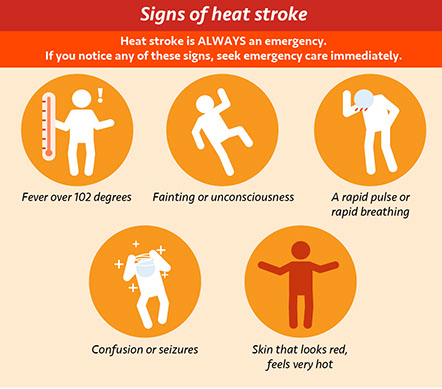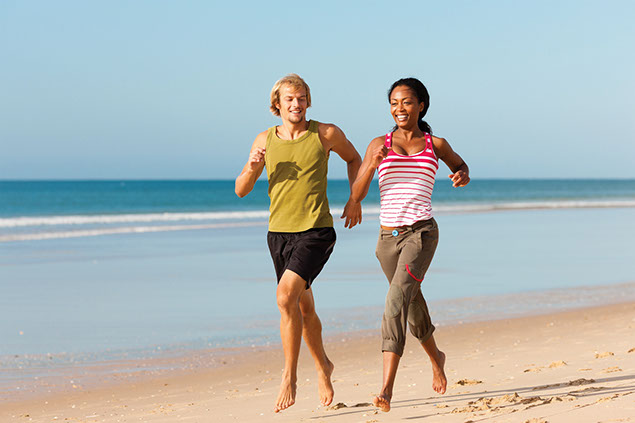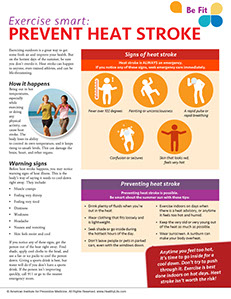SYMPTOM CHECKER
CONDITIONS
Male
Female
Child
Arm, Hand & Shoulder Concerns
Legs & Feet Concerns
Dental & Mouth Concerns
Ear & Nose
Eye Conditions
Head Conditions
Arm, Hand & Shoulder Concerns
Legs & Feet Concerns
Front
Back
Arm, Hand & Shoulder Concerns
Dental & Mouth Concerns
Ear & Nose
Eye Conditions
Head Conditions
Arm, Hand & Shoulder Concerns
Dental & Mouth Concerns
Ear & Nose
Eye Conditions
Head Conditions
Front
Back
Arm, Hand & Shoulder Concerns
Neck Links
Head & Neck Concerns
Arm, Hand & Shoulder Concerns
Neck Links
Head & Neck Concerns
Front
Back
Online Clinic
Wise Healthcare
Exercise smart:
Prevent heat stroke
Print on Demand
Exercising outdoors is a great way to get some fresh air and improve your health. But on the hottest days of the summer, be sure you don’t overdo it. Heat stroke can happen to anyone, even trained athletes, and can be life-threatening.
How it happens
Being out in hot temperatures, especially while exercising or doing any physical activity, can cause heat stroke. The body loses its ability to control its own temperature, and it keeps rising to unsafe levels. This can damage the brain, heart, and other organs.
Warning signs
Before heat stroke happens, you may notice warning signs of heat illness. This is the body’s way of saying it needs to cool down right away. They include:
• Muscle cramps
• Feeling very thirsty
• Feeling very tired
• Dizziness
• Weakness
• Headache
• Nausea and vomiting
• Skin feels moist and cool
If you notice any of these signs, get the person out of the heat right away. Find shade, apply cool cloths to the head, and use a fan or ice packs to cool the person down. Giving a sports drink is best, but water will do if you don’t have a sports drink. If the person isn’t improving quickly, call 911 or go to the nearest emergency room.

Preventing heat stroke
Preventing heat stroke is possible. Be smart about the summer sun with these tips:
• Drink plenty of fluids when you’re out in the heat.
• Wear clothing that fits loosely and is lightweight.
• Seek shade or go inside during the hottest hours of the day.
• Don’t leave people or pets in parked cars, even with the windows down.
• Exercise indoors on days when there is a heat advisory, or anytime it feels too hot and humid.
• Keep the very old or very young out of the heat as much as possible.
• Wear sunscreen. A sunburn can make your body overheat.
Anytime you feel too hot, it’s time to go inside for a cool down. Don’t try to push through it. Exercise is best done indoors on hot days. Heat stroke isn’t worth the risk!
This website is not meant to substitute for expert medical advice or treatment. Follow your doctor’s or health care provider’s advice if it differs from what is given in this guide.
The American Institute for Preventive Medicine (AIPM) is not responsible for the availability or content of external sites, nor does AIPM endorse them. Also, it is the responsibility of the user to examine the copyright and licensing restrictions of external pages and to secure all necessary permission.
The content on this website is proprietary. You may not modify, copy, reproduce, republish, upload, post, transmit, or distribute, in any manner, the material on the website without the written permission of AIPM.
2021 © American Institute for Preventive Medicine - All Rights Reserved. Disclaimer | www.HealthyLife.com
















































